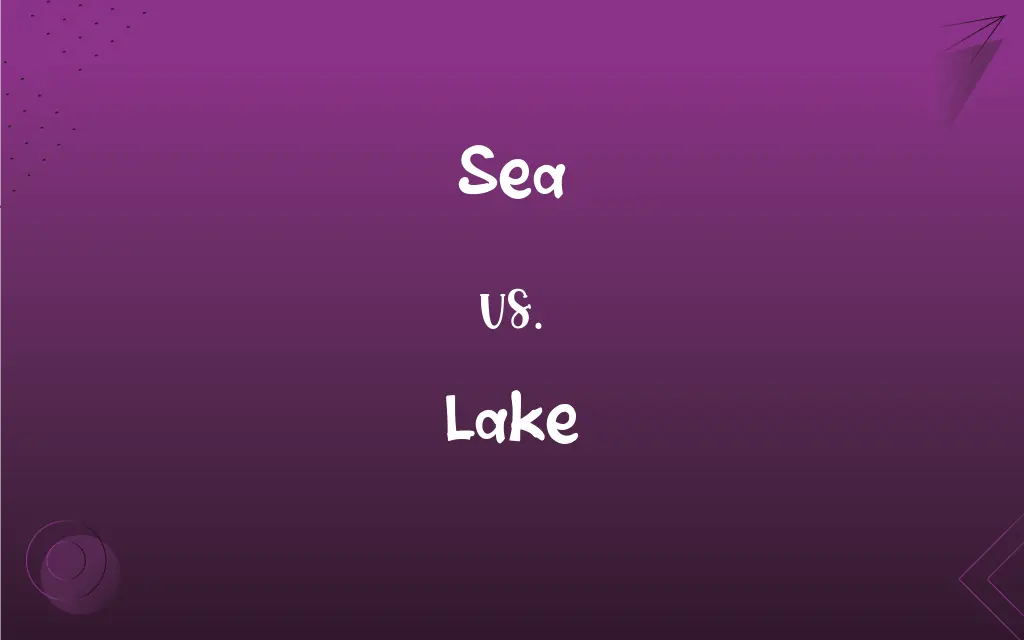Sea vs. Lake: What's the Difference?
Edited by Aimie Carlson || By Harlon Moss || Updated on July 1, 2024
A sea is a vast body of saline water connected to an ocean, while a lake is an inland body of water, usually freshwater, that is not part of the ocean.

Key Differences
The term "sea" refers to a significant expanse of saline or saltwater that is smaller than an ocean and generally connected to it. Seas are characterized by their significant size and saline content which is often related to the oceans they connect with. On the other hand, a "lake" defines an area filled with water, localized in a basin, surrounded by land, apart from any river or other outlet that serves to feed or drain the lake.
A sea is considerably larger compared to a lake and is commonly connected to the world's major oceans. Seas might be partially enclosed by land, but they open into larger bodies of water. Unlike seas, lakes are usually enclosed by land and can be found in areas removed from large bodies of water, thus lakes are typically not associated with other larger bodies of water.
Notably, seas are saline due to their connection with oceans, offering a saltwater environment. Consequently, the biological ecosystems within seas, such as coral reefs and saltwater fish species, differ vastly from freshwater bodies. In contrast, lakes are typically composed of freshwater and harbor various species that have adapted to such environments, such as freshwater fish and various freshwater plants.
Regarding their formation, seas are primary features and essential components of the Earth's hydrosphere. They can have various depths and are influential in regulating the Earth’s climate and weather patterns. Lakes, conversely, can be formed through a variety of geological processes, such as tectonic plate movements, glacial activity, and volcanic activity, presenting various forms and sizes.
An additional distinction comes from human usage and interaction with these bodies of water. Seas have historically been crucial for human navigation and trade, facilitating interaction and exchange between distant peoples and cultures. On the other hand, lakes have often been pivotal in providing inland populations with access to freshwater, enabling activities such as fishing and providing vital resources.
ADVERTISEMENT
Comparison Chart
Connection
Typically connected to an ocean
Generally an isolated body of water
Water Type
Saltwater due to its connection with oceans
Mostly freshwater, but can be saline too
Biological Life
Hosts marine life adapted to saline conditions
Supports freshwater flora and fauna
Size & Depth
Larger and can be very deep
Smaller and generally not as deep as seas
Human Interaction
Historically significant for trade and navigation
Often utilized for freshwater and recreation
ADVERTISEMENT
Sea and Lake Definitions
Sea
A sea is a broad expanse of saline water.
The Red Sea is known for its remarkable coral reefs.
Lake
Lakes are usually formed by natural geological processes.
Crater Lake was formed by the collapse of a volcano.
Sea
The sea is commonly used for various recreational activities.
Many tourists enjoy scuba diving in the Caribbean Sea.
Lake
A lake is a body of water entirely surrounded by land.
Lake Superior is one of the largest freshwater lakes in the world.
Sea
A sea is a division of the ocean, partially enclosed by land.
The Mediterranean Sea is bordered by several European and African countries.
Lake
A lake may have outlets like rivers or streams.
Lake Tahoe is drained by the Truckee River.
Sea
A sea often facilitates international trade and navigation.
The Arabian Sea has been a crucial trade route for centuries.
Lake
Lakes are pivotal for supporting adjacent terrestrial ecosystems.
The African Great Lakes are essential for the ecosystems and human populations around them.
Sea
Seas possess unique ecosystems and marine life.
The Baltic Sea hosts a variety of fish species like cod and herring.
Lake
Lakes can be found in various climatic conditions.
Lake Baikal in Siberia is known for its stunning winter ice formations.
Sea
The continuous body of salt water covering most of the earth's surface, especially this body regarded as a geophysical entity distinct from earth and sky.
Lake
A large inland body of fresh water or salt water.
Sea
A tract of water within an ocean.
Lake
A scenic pond, as in a park.
Sea
A relatively large body of salt water completely or partially enclosed by land.
Lake
A large pool of liquid
A lake of spilled coffee on my desk.
FAQs
How are seas and lakes different in terms of size?
Seas are generally larger and deeper than lakes.
How are sea ecosystems different from lake ecosystems?
Sea ecosystems are adapted to saline conditions, whereas lake ecosystems are generally adapted to freshwater conditions.
What is a sea?
A sea is a large body of saline water, generally connected to an ocean.
Is the Dead Sea a sea or a lake?
Despite its name, the Dead Sea is technically a salt lake due to its complete enclosure by land.
What defines a lake?
A lake is an inland body of water, usually freshwater, surrounded by land.
Why are some lakes saline?
Some lakes become saline through evaporation, which concentrates the salts in the water.
What role do seas play in climate regulation?
Seas absorb carbon dioxide and heat, playing a crucial role in global climate regulation.
Can lakes have waves like seas?
Lakes can have waves, but they are typically much smaller than sea waves unless the lake is very large.
Are all lakes freshwater bodies?
While most lakes are freshwater, some, like the Great Salt Lake, contain high salt concentrations.
Can lakes be used for drinking water?
Many lakes provide vital sources of drinking water, though the water must usually be treated.
How can lakes be formed by glacial activity?
Glacial lakes form when a glacier erodes the land and then melts, filling the depression with water.
What is the significance of the Mediterranean Sea in history?
The Mediterranean Sea has been pivotal in connecting cultures and facilitating trade and conquest in human history.
How is sea salt harvested?
Sea salt can be harvested by evaporating seawater, leaving behind the salts.
What is a source of danger in seas not usually found in lakes?
Hurricanes, which can form over large bodies of warm seawater, are a danger in seas but not in lakes.
Which is typically deeper, a sea or a lake?
Seas are typically deeper than lakes, with some exceptions like Lake Baikal, which is notably deep.
How do humans use seas for transportation?
Seas have historically been utilized for navigation and international trade routes.
Are lakes affected by tides like the seas?
Lakes are not significantly affected by tides, which are primarily driven by the gravitational pull of the moon and sun on the oceans.
Can seas be entirely enclosed by land?
No, seas are typically at least partially connected to an ocean.
Can lakes be man-made?
Yes, lakes can be man-made and are often called reservoirs, created for purposes like water storage and recreation.
What are bioluminescent bays found in some seas?
Bioluminescent bays, like those in Puerto Rico, contain microorganisms that produce light, creating a glowing effect in the sea water.
About Author
Written by
Harlon MossHarlon is a seasoned quality moderator and accomplished content writer for Difference Wiki. An alumnus of the prestigious University of California, he earned his degree in Computer Science. Leveraging his academic background, Harlon brings a meticulous and informed perspective to his work, ensuring content accuracy and excellence.
Edited by
Aimie CarlsonAimie Carlson, holding a master's degree in English literature, is a fervent English language enthusiast. She lends her writing talents to Difference Wiki, a prominent website that specializes in comparisons, offering readers insightful analyses that both captivate and inform.































































